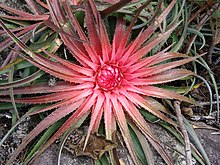Orthophytum
| Orthophytum | |
|---|---|

| |
| Scientific classification | |
| Kingdom: | Plantae |
| Clade: | Tracheophytes |
| Clade: | Angiosperms |
| Clade: | Monocots |
| Clade: | Commelinids |
| Order: | Poales |
| Family: | Bromeliaceae |
| Subfamily: | Bromelioideae |
| Genus: | Orthophytum Beer |
| Synonyms[1] | |
| |
Orthophytum (Greek "ortho" = straight and "phytum" = plant) is a genus in the plant family Bromeliaceae, subfamily Bromelioideae.
Distribution[]
All the species of the bromeliad genus are endemic to the Atlantic Forest biome (Mata Atlantica Brasileira), located in southeast Brazil.[1][2][3][4]
Species are found in the Brazilian states of Alagoas, Bahia, Espírito Santo, Minas Gerais, Paraíba, and/or Pernambuco.[2]
Due to recent advances in technology and DNA testing many of the original Orthophytum species and cultivars have been reclassified under new genera.[5]
Species[]
- Philcox
- Orthophytum alvimii W. Weber
- (Ule) L.B. Smith
- Orthophytum atalaiense J.A. Siqueira & Leme
- Orthophytum benzingii Leme & H. Luther
- Leme & L. Kollmann
- Orthophytum braunii Leme
- L.B. Smith & R.W. Read
- Leme
- Orthophytum compactum L.B. Smith
- Leme & M. Machado
- Orthophytum disjunctum L.B. Smith
- Orthophytum duartei L.B. Smith
- Leme
- Orthophytum estevesii (Rauh) Leme
- Orthophytum falconii Leme
- Orthophytum foliosum L.B. Smith
- Orthophytum fosterianum L.B. Smith
- Orthophytum glabrum (Mez) Mez
- Orthophytum grossiorum Leme & Paula
- Orthophytum gurkenii Hutchison
- Leme & M. Machado
- Leme
- Orthophytum heleniceae Leme
- Orthophytum horridum Leme
- L.B. Smith
- (Versieux & Leme) Louzada & Versieux
- Orthophytum jabrense G.S. Baracho & J.A. Siqueira
- Orthophytum lanuginosum Leme & Paula
- Orthophytum lemei E. Pereira & I.A. Penna
- Orthophytum leprosum (Mez) Mez
- Orthophytum lucidum Leme & H. Luther
- E. Pereira & I.A. Penna
- Leme & M. Machado
- Orthophytum magalhaesii L.B. Smith
- Orthophytum maracasense L.B. Smith
- L.B. Smith
- Wanderley & Conceição
- Orthophytum navioides (L.B. Smith) L.B. Smith
- Leme & L. Kollmann
- Leme
- Leme
- Orthophytum rubrum L.B. Smith
- Orthophytum sanctum L.B. Smith
- Orthophytum saxicola (Ule) L.B. Smith
- Leme & M. Machado
- Leme & L. Kollmann
- Orthophytum sucrei H. Luther
- E. Gross & Barthlott
- Leme
- Orthophytum triunfense J.A. Siqueira & Leme
- Orthophytum vagans M.B. Foster
- Orthophytum zanonii Leme

Cultivated Orthophytum gurkenii.
Selected cultivars and hybrids[]
Cultivars and hybrids cultivated as ornamental plants include:
- Orthophytum 'Andrea'
- Orthophytum 'Blaze'
- Orthophytum 'Brunswick'
- Orthophytum 'Clouds'
- Orthophytum 'Copper Penny'
- Orthophytum 'Donna Shaw'
- Orthophytum 'Iron Ore'
- Orthophytum 'Ivory Tower'
- Orthophytum 'Milagres'
- Orthophytum 'Mother Lode'
- Orthophytum 'Stardust'
- Orthophytum 'Starlights'
- Orthophytum 'Stellar Beauty'
- Orthophytum 'Warana'
- Orthophytum 'Warren Loose'
References[]
- ^ a b Kew World Checklist of Selected Plant Families
- ^ a b DPI.inpe.br: "BROMELIACEAE da MATA ATLÂNTICA BRASILEIRA: Lista de ESPÉCIES, DISTRIBUIÇÃO e CONSERVAÇÃO"; Rodriguésia 59, February 2008; ppg 209−258; article−(in Portuguese), abstract−(in English) species lists−(in Latin). accessed 30 May 2016.
- ^ "Bromeliad Society International, taxonomy". Archived from the original on 2007-02-03. Retrieved 2007-02-12.
- ^ Louzada, R. & das Graças Lapa Wanderley, M. (2010). Revision of Orthophytum (Bromeliaceae): the species with sessile inflorescences. Phytotaxa 13: 1-26.
- ^ Butcher, Derek (21 April 2019). "DD 0217 DNA / New Genera". Bromeliad.org. Retrieved 16 June 2019.
External links[]
| Wikimedia Commons has media related to Orthophytum. |
Categories:
- Orthophytum
- Endemic flora of Brazil
- Flora of Atlantic Forest (biome)
- Flora of Alagoas
- Flora of Bahia
- Flora of Espírito Santo
- Flora of Minas Gerais
- Flora of Paraíba
- Flora of Pernambuco
- Garden plants of South America
- Bromeliaceae genera